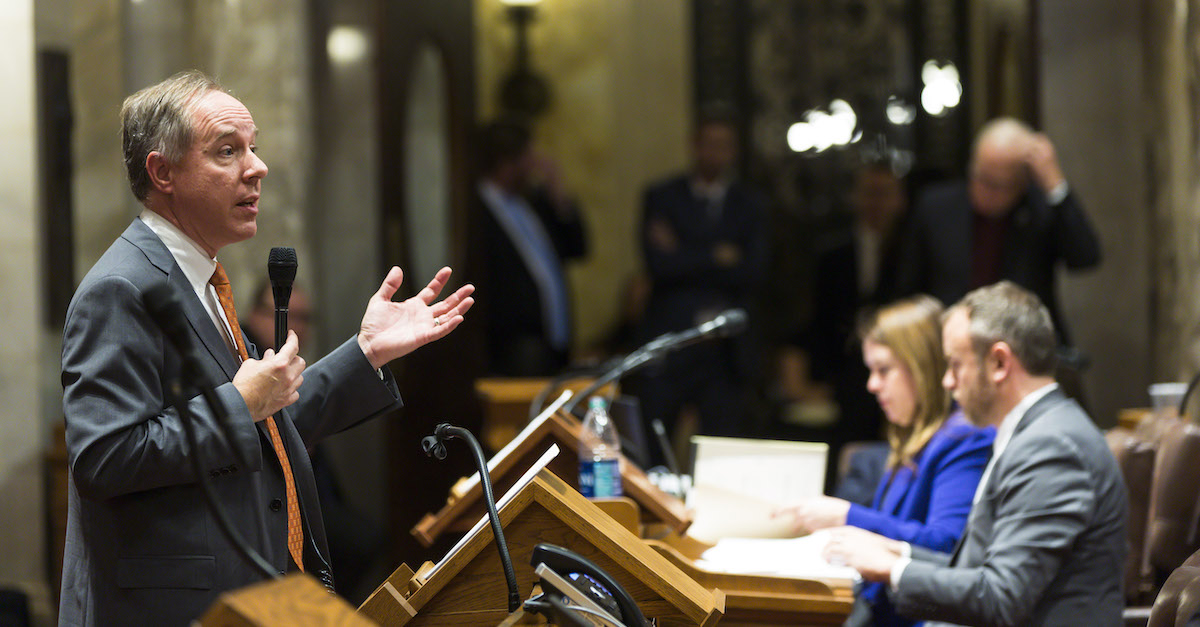
Wisconsin Assembly Speaker Robin Vos (R-Burlington) addresses the Assembly during a contentious legislative session on Dec. 4, 2018 in Madison, Wisconsin.
Shortly before the resumption of its public hearings, the Jan. 6th Committee told a federal judge that deposing Wisconsin Assembly Speaker Robin Vos (R) would reveal more about Donald Trump’s “continuing efforts to undermine the 2020 Presidential election results and the peaceful transfer of power.”
This past September, the Jan. 6th Committee subpoenaed Vos, seeking in part to learn more about his public falling out with Trump this past summer. In July, Wisconsin’s Supreme Court declared most drop box voting illegal, and Trump asked Vos to retroactively decertify the 2020 race.
After Vos replied that he didn’t have that power, Trump attacked the speaker and endorsed his primary opponent. The Jan. 6th Committee sought to question Vos about Trump’s pressure campaign, and the speaker responded by filing a lawsuit in a federal court in Wisconsin seeking to quash the subpoena.
In a new memo defending its actions, the committee said that the subpoena fails squarely within the bounds of their investigation.
“Indeed, the details of Speaker Vos’s various conversations with former President Trump about the 2020 election—and the reasons why Mr. Trump believes that an election could be reversed by a state legislature more than a year afterwards—are highly relevant to the work of the Select Committee,” the committee wrote in a memo on Tuesday. “They will assist in understanding both the scope of the efforts to undermine the democratic process and the correlative need for corrective legislation. That should be the end of the matter because it conclusively establishes that the Select Committee’s subpoena relates to a subject on which legislation could be had and, thus, is immune from challenge by virtue of the Speech or Debate Clause.”
Before this summer, Vos was a stalwart Trump ally. The speaker appointed a so-called special counsel to investigate the former president’s false claims of election fraud in 2021.
More than a year and roughly $1 million taxpayer later, the special counsel probe ended with a whimper. Trump and Vos came to public blows. A judge found that the investigation produced “no evidence” of fraud, and Vos precipitously fired and excoriated the man he appointed to lead the investigation: ex-Wisconsin Supreme Court Justice Michael Gableman, whom Vos called an “an embarrassment to the state.”
Now trying to thwart the Jan. 6th Committee’s subpoena, Vos claimed that the committee is inappropriately trying to dredge up information about events that long post-dated the attack on the U.S. Capitol.
But the Committee says that their mandate extends far beyond the physical attack.
“These continuing efforts to undermine the 2020 Presidential election results and the peaceful transfer of power are more than sufficient to justify the Select Committee’s interest in Speaker Vos’s testimony and to establish a valid legislative purpose for the subpoena issued to him,” the memo states. “Mr. Trump has stated his current desire to be reinstated as President.”
Late last month, presiding U.S. District Judge Pamela Pepper approved a speedy schedule that Vos and the committee agreed upon — but she emphasized she will need to determine whether she has jurisdiction before adjudicating on the merits.
Citing the U.S. Constitution’s Speech or Debate Clause — which protects Congress members from lawsuits over legislative speech — the committee argued that she does not.
“At bottom, Speaker Vos has improperly attempted to haul the Select Committee before this Court and obtain a judicial resolution of this dispute,” the committee’s memo says. “Such action is precisely what the Speech or Debate Clause prohibits him from doing.”
Vos had initially argued that the timing of the committee’s subpoena showed they wanted to depose him immediately before a public hearing “so that clips can be edited out to be used in a multimedia show.” For now, Vos succeeded in delaying his deposition past the committee’s next hearing, which is scheduled for Thursday.
Oral arguments in the speaker’s lawsuit have been scheduled for Oct. 24.
Read the committee’s memo here.